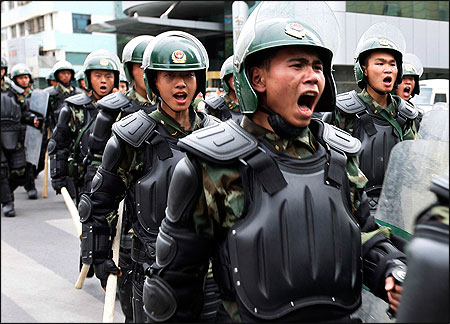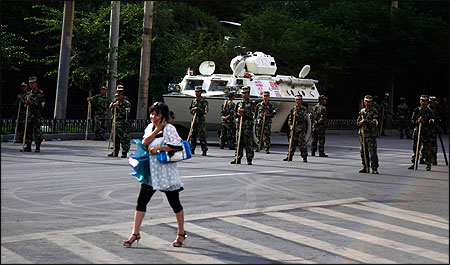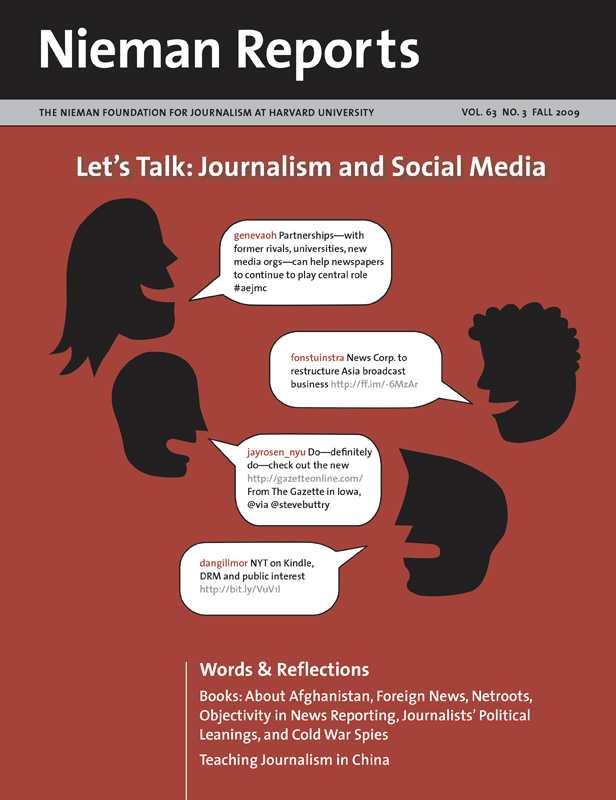
The political situations and protests in Tehran, Iran and Xinjiang, China unfolded as this summer began. So, too, did the latest round in the inevitable clash of the Internet’s borderless communications and governments’ attempt to rein them in. Similar tensions from earlier confrontations offer glimpses of the complicated relationship between the power of the Web and the question of how authoritarian rulers exert their power in return.
Follow reports on Internet censorship, and the road leads not only to China, Kenya and Iran, where governments have attempted to clamp down on the use of social media, but to Australia, Germany and the United States, where companies develop software to enable such censorship. In such stories resides the illusion that the Internet actually can and will be controlled. This myth of control is perpetuated by many in the old media, some of whom must be hoping, as they tell these stories, that their top-down approach to news gathering and distribution still has a chance against the tsunami of people-generated information that has devastated so many legacy media brands and likely will destroy more in the years ahead. (Of course, there is also the argument that when freedom of information and press is at stake, siding with those who urge restraint seems odd. But let’s not make things too complicated.)
In the telling of this Internet censorship story, a psychological component is almost certainly in play. This is, after all, a time when journalists feel their livelihood is under siege from the Internet. Although some at legacy news organizations have embraced parts of the Internet, a foreboding fear of its power and consequences prevails. Stories about the success of Internet censorship, illusionary as they might be, can provide relief to those who feel embattled and who hope that in some way the Internet can be controlled, in part because their survival depends on it.
Such hope is misguided. Add to this a trail of inaccurate reporting about what’s been happening in Xinjiang—and last year in Tibet—and a crisis of mistrust has been created. The increasingly active online community knows the Chinese news media cannot be trusted given their government control. But Western media, too, are systematically scrutinized for what is regarded as their biased reporting. In China, at least, I have observed that the Western press have lost the high ground of reliability they used to hold. Drastic cuts in funding for foreign correspondents have had an impact on the quality and diversity of reporting. Now, this force of online scrutiny cannot be stopped. Attempts to block it are answered with new, inventive ways around whatever barriers are constructed.

China’s Response
Technically, a government can shut down the Internet. But there are reasons—economic and political—that trump censorship and help to explain why it seldom does. China could have closed the entire Internet in Xinjiang province in July after riots there resulted in nearly 200 deaths and more than 1,000 wounded. In fact, reports from the region indicated that the Internet was not accessible for some time. Because Xinjiang is a marginal part of China, the consequences of temporarily bringing its economy to a standstill are not huge for the country as a whole. However, when China and Iran, as nations, experience political crisis and citizen protest, they cannot afford to close down the digital highway of information given the impact this would have on commerce and the economy. North Korea is the only country that has fully controlled the Internet, though few countries seem to be willing to follow its example.
Throughout the rest of China, the response of the telecommunication operators was more moderate during the Xinjiang crisis. Twitter, YouTube, some local clones of Twitter, and a few other sites were shut down for a time. I watched as the number of tweets from China was reduced a bit, but after three hours they were up to speed again. Although the information flow was more limited—and most of the Western and Chinese media mostly stuck to the same story lines they’d been reporting since the start of the riots—a flood of fresh video clips, digital commentaries, and blog posts made it around the government’s Internet barriers.
This situation was described in the China Digital Times in early July:
Nevertheless, many Chinese netizens are still managing to access outside information and publish their views on the situation. For example, photographs taken by foreign journalists are being spread online; people are finding ways to post on Twitter despite the site being blocked; and netizens are still finding ways to post their views to BBS forums. Overseas Chinese Web sites and communities are also playing a role by posting information and discussions, many of which can find their way back into Chinese cyberspace.
Stories from Xinjiang, some true, some not, kept arriving in my computer. Some Internet users shared information about ways to work around the Internet blocks, helpful to those who had not yet discovered such tools. This was testimony to the ineffectiveness of what some in the Western media were describing as an Internet “crackdown.” In the meantime, Chinese officials, with years of experience in filtering the Internet, were practicing well the lessons they’ve learned: Use their force sparingly since this prevents a new generation of Internet users from discovering the numerous ways netizens have figured out to thwart their efforts.
Every now and then, however, one of China’s senior leaders panics and suddenly the country finds not only Twitter, but even Google has been blocked. Earlier this year, this happened for a short while. Such measures prove to be not only ineffective in terms of stopping the flow of information, but the economic effects of such a closure, if it was to last for some time, would be massive. Because of this, even these impulses to undertake larger scale Internet blockages disappear after a short while. Additionally, the Chinese have learned, too, how to use the Internet as their watchful eyes and ears. At times, the government’s public relations officials improve even their spin as a result of using the Internet as a vehicle for disseminating information. Shutting down or restraining the Internet, especially in times of crises, would make it impossible for those eyes and ears to pick up information about what’s happening, and it would shut down the government’s channels for countering with their own messages.
In these ways, the Internet presents a very different medium from radio, TV and print in terms of how governments respond in times of severe crisis. Whereas a government takeover of broadcast stations or print publications is a fairly straightforward operation, this isn’t so with the Internet. As the Internet is teaching, conversation rules. Those who want to share information will employ whatever digital tool can be used to keep the flow of information going. Platforms still matter, but they can be replaced if they are shut down. And shutting them down isn’t as simple as it used to be.
Fons Tuinstra, who now directs the China Speakers Bureau, was a foreign correspondent in Shanghai.



